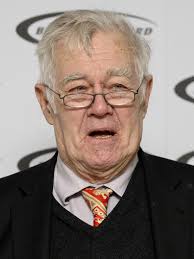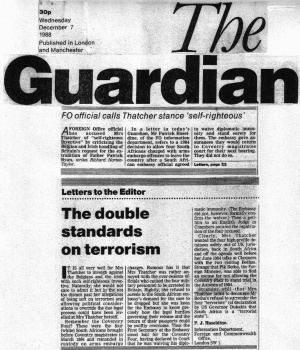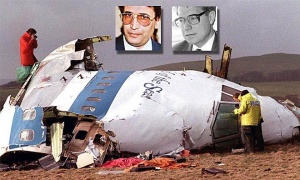Difference between revisions of "Richard Ingrams"
m (Text replacement - " terrorism" to " "terrorism"") |
|||
| Line 32: | Line 32: | ||
[[File:Guardian_1.jpg|right|thumb|300px|[[Patrick Haseldine]]'s letter was published 14 days before the [[Pan Am Flight 103|Lockerbie Bombing]] ]] | [[File:Guardian_1.jpg|right|thumb|300px|[[Patrick Haseldine]]'s letter was published 14 days before the [[Pan Am Flight 103|Lockerbie Bombing]] ]] | ||
In the ''Observer'' of Sunday 11 December 1988, Richard Ingrams wrote: | In the ''Observer'' of Sunday 11 December 1988, Richard Ingrams wrote: | ||
| − | :I switched on the ''Today Programme'' last week to hear a nicely spoken man being cross-examined about the silly plan to make local government candidates in Ulster sign a renunciation of violence before they can stand for office. The man, whom I assumed to be a junior Government Minister of some kind, defended the measure as best he could, saying that he was sure it would be a useful weapon in the battle against terrorism and one which was bound to reduce violence. | + | :I switched on the ''Today Programme'' last week to hear a nicely spoken man being cross-examined about the silly plan to make local government candidates in Ulster sign a renunciation of violence before they can stand for office. The man, whom I assumed to be a junior Government Minister of some kind, defended the measure as best he could, saying that he was sure it would be a useful weapon in the battle against "terrorism" and one which was bound to reduce violence. |
:"Thank you Mr Ashdown," the interviewer concluded after a minute or two. It turned out, to my great surprise, that the speaker was the newly-elected leader of the Democrats and the man who has pledged himself to replace Mr [[Neil Kinnock]] as the Leader of the Opposition. [[Paddy Ashdown]] appears not to have grasped the point that the job of an Opposition leader is to oppose. In this respect, there is nothing to choose between him and his rival [[Dr David Owen]]. | :"Thank you Mr Ashdown," the interviewer concluded after a minute or two. It turned out, to my great surprise, that the speaker was the newly-elected leader of the Democrats and the man who has pledged himself to replace Mr [[Neil Kinnock]] as the Leader of the Opposition. [[Paddy Ashdown]] appears not to have grasped the point that the job of an Opposition leader is to oppose. In this respect, there is nothing to choose between him and his rival [[Dr David Owen]]. | ||
:[[David Owen|Owen]] is a natural Tory, as he showed again last week over the case of Mr [[Patrick Haseldine]], the Foreign Office official, who in a letter to ''The Guardian'' last week made a splendid kamikaze attack on [[Margaret Thatcher|Mrs Thatcher]] for indulging in 'self-righteous invective' over the [[Patrick Ryan]] case. | :[[David Owen|Owen]] is a natural Tory, as he showed again last week over the case of Mr [[Patrick Haseldine]], the Foreign Office official, who in a letter to ''The Guardian'' last week made a splendid kamikaze attack on [[Margaret Thatcher|Mrs Thatcher]] for indulging in 'self-righteous invective' over the [[Patrick Ryan]] case. | ||
Latest revision as of 21:47, 12 June 2017
(Journalist, Author) | |
|---|---|
 Co-founder of Private Eye | |
| Born | Richard Reid Ingrams 1937-08-19 Chelsea, London, England, United Kingdom |
| Alma mater | University College (Oxford) |
| Parents | Leonard St Clair Ingrams and Victoria "Née" Reid |
| Children | 3 |
| Spouse | Sara Sudain |
Richard Reid Ingrams (born 19 August 1937 in Chelsea, London[1][2]) is an English journalist, a co-founder and second editor of the British satirical magazine Private Eye, and founding editor of The Oldie magazine.
Richard Ingrams left the latter job at the end of May 2014 and was replaced by his friend Alexander Chancellor.[3][4]
Contents
Career
Richard Ingrams's parents were Leonard St Clair Ingrams and Victoria née Reid (daughter of Sir James Reid), who had three other sons, including the banker and opera impresario Leonard Ingrams (1941–2005).[5] Ingrams was educated at the independent preparatory school West Downs in Winchester, Hampshire, followed by Shrewsbury School, where he met Willie Rushton and edited the school magazine. Before attending Oxford, he did his National Service in the army ranks after failing his interview for officer training, something which was unusual for someone from his background at the time. At University College, Oxford, where he read Classics, he shared tutorials with Robin Butler, later Cabinet Secretary and sometimes referred to as a "pillar of the Establishment". More importantly, he met Paul Foot, another former Shrewsbury pupil not yet the left-wing radical he became, who was to be a lifelong friend, and whose biography Ingrams wrote after Foot's early death.
Along with several other Old Salopians, including Willie Rushton, Ingrams founded Private Eye in 1962, taking over the editorship from Christopher Booker in 1963. It was a classic case, he claimed on Desert Island Discs in 2008, of the "old boy network". Private Eye was part of the satire boom of the early 1960s, which included the television show That Was The Week That Was, for which Ingrams wrote, and The Establishment nightclub, run by Peter Cook. When Private Eye ran into financial problems Cook was able to gain a majority shareholding on the proceeds of his brief but financially successful venture.
Richard Ingrams vacated the editor's chair at the Eye in 1986, with Ian Hislop taking over. In 1992 Ingrams created and became editor of The Oldie, a now monthly humorous lifestyle and issues magazine mainly aimed at the older generation. As of 2005 he was still chairman of Private Eye, working there every Monday,[6] spending four days a week in London.[7]
He was a regular on the radio panel quiz The News Quiz for its first twenty years and contributed a column to The Observer for eighteen years. In late 2005 he moved to The Independent, considering The Observer to have gone downhill, particularly as a consequence of its support for the Iraq war. In his 27 August 2011 column, he announced that he had been sacked by the newly appointed editor of The Independent. Shortly after the death of Jimmy Savile, because several national newspapers were unwilling to publish, Ingrams' The Oldie was the first publication to break the story of Savile's history of child abuse.[8]
After a series of clashes with James Pembroke, owner and publisher of The Oldie, Ingrams left the magazine at the end of May 2014 having resigned as editor. He is currently writing a biography of Ludovic Kennedy.
Splendid kamikaze attack on Mrs Thatcher
In the Observer of Sunday 11 December 1988, Richard Ingrams wrote:
- I switched on the Today Programme last week to hear a nicely spoken man being cross-examined about the silly plan to make local government candidates in Ulster sign a renunciation of violence before they can stand for office. The man, whom I assumed to be a junior Government Minister of some kind, defended the measure as best he could, saying that he was sure it would be a useful weapon in the battle against "terrorism" and one which was bound to reduce violence.
- "Thank you Mr Ashdown," the interviewer concluded after a minute or two. It turned out, to my great surprise, that the speaker was the newly-elected leader of the Democrats and the man who has pledged himself to replace Mr Neil Kinnock as the Leader of the Opposition. Paddy Ashdown appears not to have grasped the point that the job of an Opposition leader is to oppose. In this respect, there is nothing to choose between him and his rival Dr David Owen.
- Owen is a natural Tory, as he showed again last week over the case of Mr Patrick Haseldine, the Foreign Office official, who in a letter to The Guardian last week made a splendid kamikaze attack on Mrs Thatcher for indulging in 'self-righteous invective' over the Patrick Ryan case.
- Instead of taking up Mr Haseldine's point and using it as a stick to beat the Government with, as any good Opposition leader would have done, Dr Goody-Two-Shoes called for Haseldine's immediate dismissal.[9]
Lockerbie: not looking for anyone else
In his column in The Independent of 2 May 2009, Richard Ingrams wrote:
- We are not looking for anyone else. That is the traditional response of the police when faced with the acquittal of men they are convinced were guilty all along. They were at it again this week when three men accused of assisting the 7 July suicide bombers were found not guilty. Andy Hayman, former commissioner of Special Operations at Scotland Yard, wrote of "a sense of bitter disappointment" at the acquittal of the men. And this he said was probably "the last throw of the dice". The police had done a very thorough investigation but the evidence was "not convincing enough". The implication is clear. The men were almost certainly guilty. The police just didn't have the evidence to prove it. At no point was Hayman prepared to admit that they might just have been innocent.
- As it happened, the acquittal of the three men coincided with the reopening of an appeal case in a terrorist attack far more serious even than that of 7 July – the Lockerbie bombing of 1988 which resulted in the deaths of 270 people. The Libyan convicted of the bombing, Mr Abdelbaset al-Megrahi, began an appeal in Scotland against his conviction in 2001. Megrahi did not have the benefit of a jury trial but was found guilty by three Scottish judges who persuaded themselves that he had put a bomb in a suitcase in Malta which went unaccompanied to Frankfurt where it was loaded on to another plane to Heathrow before being transferred on to Pan Am Flight 103 to the US and exploding over Scotland.
- Should Megrahi's appeal succeed, it will be interesting to see if the Scottish police say that they are not looking for anyone else.[10]
Private life
Richard Ingrams married Mary Morgan on 24 November 1962; they had three children: a son, Fred (b. 14 February 1964), who is an artist; a second son, Arthur, who was disabled and died in childhood; and a daughter, Margaret ("Jubby", 4 May 1965 – 12 May 2004), who was married to David Ford ("an executive with society caterers The Admirable Crichton") and a mother of three, and died aged 39 of a heroin overdose in Brighton.[11]
By 1993 Ingrams had become involved with Deborah Bosley, a former head waitress at the Groucho Club and an author. Ingrams played the organ for many years in his local Anglican church in Aldworth, Berkshire, each Sunday.[12] The Romney Marsh Historic Churches Trust was formed under the patronage of Ingrams and the then Archbishop of Canterbury, Robert Runcie. In 2011 he announced he had converted to Roman Catholicism.
Ingrams currently lives in Berkshire with his wife Sara, a medical researcher with two sons, and his youngest son Louis.[13]
A biography, Richard Ingrams: Lord of the Gnomes (ISBN 0-434-77828-1) by Harry Thompson, was published in 1994.
Books by Richard Ingrams
As author
- Mrs Wilson's Diary (with John Wells) 1965
- Mrs Wilson's Second Diary (with John Wells) 1966
- Mrs Wilson's Diaries (with John Wells) 1967
- The Tale of Driver Grope (with Ralph Steadman) 1969
- The Bible for Motorists: By Old Jowett (with Barry Fantoni) 1970
- Harris in Wonderland: By Philip Reid (pseudonym of Ingrams and Andrew Osmond) 1973
- God's Apology: A Chronicle of Three Friends 1977
- Goldenballs 1979
- Dear Bill: The Collected Letters of Denis Thatcher (with John Wells) 1980
- Romney Marsh 1980
- The Other Half: Further Letters of Denis Thatcher (with John Wells) 1981
- One for the Road (with John Wells) 1982
- Piper's Places: John Piper in England & Wales (with John Piper) 1983
- My Round! (with John Wells) 1983
- Bottoms Up! (with John Wells) 1984
- Down the Hatch! (with John Wells) 1985
- John Stewart Collis: A Memoir 1986
- Just the One (with John Wells) 1986
- The Best of "Dear Bill" (with John Wells) 1986
- Mud in Your Eye! (with John Wells) 1987
- You Might as Well be Dead 1988
- Still Going Strong (with John Wells) 1988
- The Ridgeway: Europe's Oldest Road 1988
- Number 10 (with John Wells) 1989
- On and On (with John Wells) 1990
- Muggeridge: The Biography 1995
- I Once Met: Fifty Encounters with the Famous 1996
- My Friend Footy: A Memoir of Paul Foot 2005
- The Life and Adventures of William Cobbett 2005
As compiler and editor
- What the Papers Never Meant to Say: "Private Eye's" Second Book of Boobs 1968
- The Life and Times of Private Eye 1961–1971 1971
- Beachcomber: The Works of J. B. Morton 1974
- Cobbett's Country Book: An Anthology of William Cobbett's Writings on Country Matters 1974
- "Private Eye's" Book of Pseuds: A Mood Statement 1975
- "Private Eye's" Second Book of Pseuds 1977
- The Penguin Book of Private Eye Cartoons 1983
- Dr Johnson by Mrs Thrale: The "Anecdotes" of Mrs Piozzi in Their Original Form 1984
- England: An Anthology 1989
- The Bumper Beachcomber 1991
- The Oldie Book of Cartoons 1996
- More Cartoons 1996
- Jesus: Authors Take Sides: An Anthology 1999
- The Oldie Book of Cartoons, 1992–2009 2009
- The Oldie Book of Cartoons: A New Selection 2013
References
- ↑ Richard Ingrams biography
- ↑ "Record at 'findmypast'"
- ↑ Ben Quinn "Richard Ingrams resigns as editor of the Oldie over dispute with publisher", The Guardian, 31 May 2014
- ↑ "Oldie friends again? Richard Ingrams and Alexander Chancellor end bitter feud"
- ↑ "Richard Ingrams in love – is he serious?" by Elizabeth Grice, The Telegraph, 3 March 2011.
- ↑ Rob McGibbon "Richard Ingrams interview", Press Gazette 15 December 2005
- ↑ Deborah Bosley "Country living stinks", New Statesman, 26 June 2000. Retrieved on 3 August 2008
- ↑ William Turvill "Why The Oldie exposed Savile child abuse: 'I just thought it was a good story'", Press Gazette, 2 April 2013
- ↑ "Splendid kamikaze attack on Mrs Thatcher"
- ↑ "Richard Ingrams’s Week: There is never enough evidence"
- ↑ "Daughter of ex-Private Eye editor killed by overdose"
- ↑ Michael Leapman "The New Statesman Profile – Richard Ingrams", 11 March 2002. Retrieved on 3 August 2008.
- ↑ "Richard Ingrams: 'I have lots of enemies, some of them enduring'" by Stuart Jeffries, The Guardian, 8 June 2014
Wikipedia is not affiliated with Wikispooks. Original page source here

